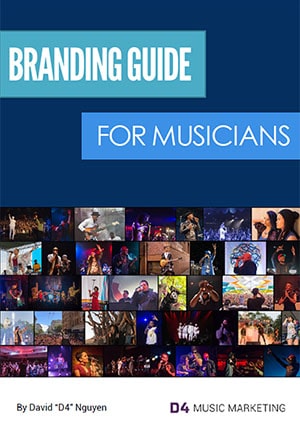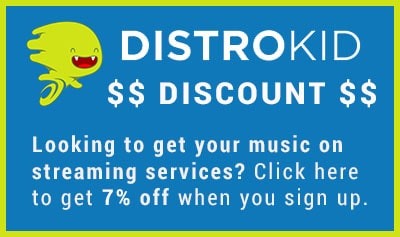
In an ideal situation, your sole focus would be on making music and not having to worry about marketing, booking, promotion, accounting, or any other business functions. Unless you are signed by a label or have a large budget (let’s face it, most of us don’t), chances are you gotta do it all yourself.
You may hate the business side of things (or just would rather spend your time doing something you actually enjoy), but don’t let that discourage you from incorporating these fundamental business concepts that will improve your chances of making a living off music. Here are 6 must learn business and marketing concepts that you need to know:
1. Target Market: Your Bread and Butter
Once you know who you are and what you represent, you will have a better understanding of what kind of people will like your music. If you are just starting out, then you should define the type of people that you think your music will mostly appeal to. This is your target market or your ideal fans. Of course, not everyone will fit into neat little buckets, but if you sampled your fan base you should be able to decipher their demographics, such as:
- Sex
- Age range within ten years (example 25-34 year olds)
- Occupation (blue collar, white collar, unemployed, student, etc)
- Lifestyle choices
- Income level
- Education level
- Ethnicity
You can also discover some behavioral characteristics, including:
- How they like to discover new music
- How they consume music (streaming, downloads, buy cds)
- What music sites, blogs, social media channels they visit
Putting all this information together will allow you to identify your target market so you know where to find them and how you can attract them. Your target market is your bread and butter, because these are the individuals who will be paying for your music and coming to your shows. It shouldn’t be too difficult to determine who your target market is, because often times they are going to be similar to you.
Once you understand who your target market is, you can market your music more effectively. This will save you time and money since you aren’t trying to be all things to all people or pay for advertising that isn’t going to reach potential fans. Start by finding out where do they hang out or spend time online. Find out what social media they use, blogs they read and websites they visit. This isn’t limited to the online space, so think about physical locations in your town or city as well. These would be the venues you want to try to play at.
Bottom line, know your ideal fan inside out. Create a picture of your target market, so that you can understand who you are trying to reach. Defining your target market often gets neglected but is one of the most important marketing concepts and will increase your chances of creating a sustainable career from music.
2. Fan Retention: Hunters vs Farmers
There’s a misconception that all you need is more exposure to be a success. The problem with only hunting is it costs more money to acquire a new customer (or fan in your case) then it does to retain one you already have. In fact, acquiring a new customer is about five times more expensive than keeping an existing one.
Because of this fact, it is not the best use of your time or money to chase after new fans when you have a robust fan base already built. It’s easy to get caught up in the mindset of always wanting more new fans. It may not seem like it, but neglecting the fans you already have is a costly business mistake. The amount of time, effort and money that it takes to win over new fans is why you want to keep your fan interaction consistent so that you can retain the fans you already have.
The main point to take away here is to engage your fans on a consistent basis. Always aim to deepen your connections and relationships with fans, and don’t just assume they will always stick around once they follow you on Instagram or Facebook. A fan’s like or comment is just the beginning of a long relationship. Just like your spouse or partner, this relationship will grow with patience, consistency and effort.
The key to success is in repeat business, and not the initial transaction. Engaging regularly with fans and maintaining consistency in your music will create life-long customers who will support you. Although it’s hard to come up with an exact dollar amount, the value of a lifetime fan is coveted and priceless. Not just from the money they spend individually, but also the potential for them to “refer” or recommend you to other people. So don’t think about each fan as someone who you can conduct a transaction with; think of each fan for their long-term value (put another way, how much money each fan contributes throughout your career).
Like just about anything in life, there needs to be balance between the time you spend seeking new fans and the time you spend engaging your current fan base.
3. Branding: Standout From the Crowd
Many artists don’t think of themselves as a brand, but as soon as you start putting music out, you are projecting an image. For better or for worse, people will start forming opinions about what this image represents. This is why branding is important so that people aren’t misinterpreting what you’re all about. Being in control of your brand as much as possible limits the amount of interpretation that listeners make on behalf of your brand. Of course, it’s unavoidable to be in total control of how others see, think or feel about you, but consistent brand messaging limits inaccurate brand interpretation or perception.
People judge just about everything based on its ‘cover’. Like the jacket on a book, your cover is telling people what they can expect when they see your website or when they hit that play button on Youtube. It’s important to have an impactful cover (aka brand) because your brand helps people decide if you and your music are interesting enough to listen to. It also signals whether your brand fits within their identity, values and how they want other people to perceive them.
Successful branding involves strategically highlighting an aspect of yourself so you can attract the people you want (your target market). Once you have established what your brand represents, everything you do should be inline and support the brand. To keep your branding consistent, you want to ensure that your online presence across social media platforms has a similar look and feel. You should consider customizing your URL, updating band biographies or uploading photos that support your brand. You could also have a logo or slogan that you use.
Determining your brand and then living it makes your customers feel like they know who you are and what they can expect from you. Artists without a strong and consistent brand do not last long.
4. Goal Setting: Milestones to Success
If you are serious about establishing yourself as an indie artist, you need to do more than just wing it. Booking shows, expanding your fan base and promoting your music involve detailed steps. Even after you have begun this process, how will you know if you are successful? Success looks different depending on the person.
Start with a mission and vision of what you want to do or accomplish as a musician. What does success look like for you? Is it realistically obtainable? Is it practical?
Once you have clarified your overarching vision and mission, you need to write down your measurable goals. Defining what you want to accomplish is paramount to actually accomplishing it. These measurable goals are more specific than your mission, and serve as a step-by-step guide to achieving your vision.
Once you have your list of goals, periodically look at them to see if you are on the right track or if you need to update them. Just like checking to make sure your marketing materials appeal to your target market, goals will help guide your business decisions.
How to Set Goals:
1. Decide what the “big picture” of what you want to accomplish looks like (aka your business objectives) (1-5 years).
2. Break each business objectives down into smaller, manageable goals that you will need to accomplish in order to achieve the big picture goal.
3. You can take it to a third level, by detailing milestones that will help you reach each goal.
4. Create a timeline of milestones and small goals and that you need to achieve (I suggest using Excel to speed up the process).
Make your goals SMART:
• S – Specific (or Significant)
• M – Measurable (or Meaningful)
• A – Attainable (or Action-Oriented)
• R – Relevant (or Rewarding)
• T – Time-bound (or Trackable)
Ensuring your goals follow the SMART guidelines takes a little more time, but it will really help you to narrow down your specific goals and focus on the steps you need to take to achieve them.
5. Create Good Product: The Importance of Self Awareness
There are many aspects to becoming a successful indie artist that it’s always best to remind yourself of what will make-or-break your musical career: putting out good music. Yes, good music is subjective, so not everyone has to think it is good, but your ideal fans (target market) must like it. The best marketing in the world cannot save bad music. If you aren’t consistently providing music that appeals to your fans and target audience, your career will stagnant.
Throughout your music career, and especially when you are just beginning your musical endeavors, people probably won’t hesitate to let you know what they think of your music. Criticism and even constructive feedback can be difficult to hear if you have become too attached to what you created and don’t want to accept that it may not be as good as you thought it was. In these circumstances, it can be easy to become defensive and shut down to what people are trying to tell you.
When you are too busy defending your music instead of thinking about if there may be some truth to the feedback, you will have a very difficult time evolving your music and improving. In order to avoid this trap, you have to be able to put your ego aside and evaluate yourself honestly and objectively. This will lead to greater self-awareness (being honest, open and objective with yourself), and will contribute to using feedback positively for the purpose of making good music.
You don’t necessarily have to act on what each critic chirping in your ear, but I highly suggest you take a minute to consider the feedback that was given. Make sure the feedback is from someone from your target audience. A person who listens to only classical or opera music probably does not have the right mindset to judge your rap song as someone who actually listens to hip hop. If you find yourself in a situation where you have invested time and effort in marketing but are still not seeing the progress you want, it may be time to re-evaluate your music. If this happens, make sure you are putting the most emphasis on feedback given by your target audience.
As an artist, you want to freely express yourself and communicate through your music without feeling like you have to compromise or cater to what other people think. At the same time, the music industry is still a business, so you need to listen to what your ideal fans are telling you and possibly adapting your music to meet the demand. Without paying fans, you can’t sustain a music career. This is why you need to find the right balance between being true to your own artistic expression and giving the people what they want.
I am not going to lie, it is really difficult to admit that your music isn’t as good as you believed it to be. But if you can step outside yourself, and put your ego to the side, you will be able to make the necessary adjustments. By practicing self-awareness, you will be able to keep a more open mind when evaluating your music. This will keep you on the right path to success.
6. Investing in Yourself: The Key to Growth
I feel one of the biggest mistakes emerging artists make is not investing money into their careers. If you’re constantly thinking of shortcuts and how to do things for free (or really cheap), you’re not going to make it very far.
Conclusion
Being an independent artist is like running your own small business. While it’s not necessary to have a business degree or background in marketing to be successful, it undoubtedly helps to understand some of the basic marketing and branding concepts.
At the end of the day, there is a multitude of factors that contribute to whether you can making a living off music. Retaining fans, knowing your target marketing, creating the right brand, setting goals, making smart investments and creating good music are all parts of the equation to establishing a career in music. You may not like the business aspect of being an independent artist, but understanding these 6 concepts will make sure you’re maximizing your potential to succeed.








Very helpful and interesting